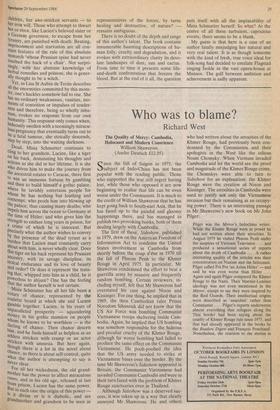Turbid dream
Francis King
The Tiger Lisa St Aubin de Teran (Cape f8.95)
T ike Somerset de Chair, Amber Blanc° d I White and Fredegonde Shove, Lisa St Aubin de Teran should be the sort of literary name that, once heard, is never forgotten. Yet, all the time that I was reading The Tiger, I kept thinking of her as Llosa St Asturias de Marquez. This is n° doubt because her novel is like some turbid dream of all the South American fiction that has come one's way in the last 20 years. The setting, except when the hero,' Lucien, travels to his German fatherland or, on his way back from there, passes through Brazil, Surinam and Guyana, is , Venezuela black with vice, suffering an ° oil; but it might be any area of South America transformed by a febrile imagina- tion into a never-never-land of mystery, magic, cruelty and beauty. Where the barren earth is not covered with cactus, yucca and prickly pear, it is covered with excrement and the swollen carcases of men and animals; and when the sky is not filial, with baleful clouds, it is filled with no less baleful vultures. Parasitism, whether rep" resented by worms infesting children or the idle rich oppressing the slaving poor, Is omnipresent. Loyalty, kindness and paY are as rare as a temperate day. Lucien's grandmother, Misia Schmutter, known as 'the Empress of Orinoco', Is 3 proud, cruel despot, bending everyone her lazy, lascivious son, her terrified grand- children, her awe-stricken servants — to her iron will. Those who attempt to thwart her or even, like Lucien's beloved sister or a German governess, to escape from her tyranny, are punished with death. Beating, imprisonment and starvation are all con- stant features of the rule of this absolute
monarch 'whose Prussian spine had never touched the back of a chair'. Not surpri- singly, with her abstruse knowledge of herbal remedies and poisons, she is gener- ally thought to be a witch. Yet, as Lisa St Aubin de Teran describes all the enormities committed by this mons- ter, one's hackles somehow fail to rise. She has no ordinary weaknesses, vanities, mo- ments of contrition or impulses of tender- ness and therefore, being so wholly inhu- man, evokes no response from our own humanity. This response only comes when, hideously swollen with a seemingly miracu- lous pregnancy that eventually turns out to be a fatal tumour, she stoically descends, step by step, into the waiting darkness. Dead, Misia Schmutter continues to Cling to her grandson, Lucien, like a tiger on his back, dominating his thoughts and actions as she did in her lifetime. It is she who drives him to make the journey from the ancestral estates to Caracas, there first to win an immense fortune by gambling and then to build himself a gothic palace, Where he lavishly entertains people for
whom he has nothing but loathing and Contempt; who prods him into blowing up
the palace, thus causing many deaths; who
impels him across the ocean to Germany at the time of Hitler; and who gives him the
strength to endure long years in prison, for a crime of which he is innocent. But precisely what the author wishes to convey bY the presence of the dead tyrant as a burden that Lucien must constantly carry about with him, is never wholly clear. Does this tiger on his back represent his Prussian ancestry, with its savage discipline, its stoical endurance and its love of beauty and order? Or does it represent the train- ing that, whipped into him as a child, he is Powerless to abjure? One has the feeling that the author herself is not certain. Misia Schmutter has all her life been a Votary of chance, represented by the roulette board at which she and Lucien
gamble together. Lucien, in his years of unparalleled prosperity — squandering
money in his gothic mansion on people
whom he knows to be worthless — is the darling of chance. Then chance deserts
him, and he finds himself as helpless as an athlete stricken with cramp or an actor stricken with amnesia. But here again,
though there is a lot in the novel about chance, as there is about self-control, quite what the author is attempting to say is never clear. For all her wickedness, the old grand- mother has the power to affect miraculous
cures; and in his old age, released at last
from prison, Lucien has the same power. But in each case the origin of this power - is it divine or is it diabolic, and are grandmother and grandson to be seen as
representatives of the forces, by turns healing and destructive, of nature? remains ambiguous.
There is no doubt of the depth and range of this author's talent. The book contains innumerable haunting descriptions of hu- man folly, cruelty and degradation, and it evokes with extraordinary clarity its deso- late landscapes of dust, sun and cactus. From time to time it presents some life- and-death confrontation that freezes the blood. But at the end of it all, the question puts itself with all the implacability of Misia Schmutter herself: So what? At the centre of all these turbulent, capricious events, there seems to be a blank.
My guess is that here is a case of an author fatally misjudging her natural and very real talent. It is as though someone with the kind of fresh, true voice ideal for folk-song had decided to emulate Flagstad singing Isolde in the vast opera-house at Manaos. The gulf between ambition and achievement is sadly apparent.















































 Previous page
Previous page